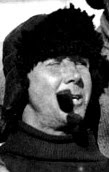Alfred Cheetham was a member of several Antarctic expeditions. He served as third officer for both the Nimrod and Imperial Trans-Antarctic expeditions. He died at sea when his ship was torpedoed during World War I.
Alfred Buchanan Cheetham was born in Liverpool, England to John and Annie Elizabeth Cheetham. His family moved to Hull sometime during his youth (possibly around 1877), and he went to sea as a teenager, working on the fishing fleets of the North Sea and farther afield. He married Eliza Sawyer and they had 13 children together. Cheetham worked from his base in Hull as a merchant navy boatswain and a reservist for the Royal Navy.
During the Discovery Expedition of 1901–1904 Cheetham made his first visit to the Antarctic when served on the relief ship Morning. He returned with the Terra Nova Expedition, Robert Falcon Scott's ill-fated attempt to be the first to reach the South Pole. He served as boatswain aboard the Terra Nova and although he volunteered for the search party that was to look for Scott's party he was turned down as he was a family man.
He travelled to the Antarctic again, this time under the command of Ernest Shackleton, on the Nimrod Expedition where he was third officer and boatswain. By the time of the Imperial Trans-Antarctic Expedition in 1914, the 47-year-old Cheetham was the crew member with most experience of the Antarctic, having spent almost six years in the seas around the continent
He was Third Officer on board the Endurance and was a popular and cheerful member of the crew. Frank Worsley refers to him as "a pirate to his fingertips". After Endurance was crushed in pack ice and the men set up for Elephant Island in the three lifeboats, he was part of Worsley's crew in the Dudley Docker. Worsley mentions that matches had become such precious currency that Cheetham bought a single match from him for the price of a bottle of champagne, to be paid when Cheetham opened his pub in Hull after the war. Cheetham's death in 1918 meant the debt was never paid. For his efforts during the expedition Cheetham was awarded the Silver Polar Medal.
Cheetham returned to Hull after the expedition where he learnt that one of his sons, William Alfred, had been lost at sea while Cheetham had been travelling back from Antarctica. His son, who was 16 years old, was presumed drowned while serving on the S.S. Adriatic. Cheetham enlisted in the Mercantile Marine and was serving as Second Officer on the S.S. Prunelle (London) when on 22 August 1918, he was killed when the ship was torpedoed in the North Sea by a German U-boat.


No comments:
Post a Comment